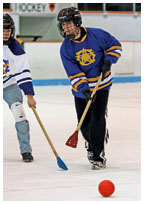 |
January 23, 2008: On the Campus
Seniors Dan Pall, left, and David Rose, members of the Colonial Club broomball team, on the ice at Baker Rink last month.(photos: Hyunseok shim ’08) |
Broomball sweeps campus; new upperclass meal option
By Julia Osellame ’09
As the men’s and women’s hockey teams don’t grace the ice with their skates, other students crowd onto Baker Rink with their sneakers and sweatpants, ready to enter a competition that pits friend against friend and residential college against eating club.
Broomball, lauded by students as the most popular intramural sport at Princeton, attracts a wide array of student groups. The intramural sports office capped the number of teams entering a Dec. 6 tournament at 40.
Matt Davis ’09 said he enjoys both playing and watching broomball, calling it “the quintessential intramural college sport.”
A team of five players and a goalie tries to get an orange ball, about twice the size of a lacrosse ball, into the opposition’s net by using sticks with a plastic triangular end that resembles a broom. There is no checking and no handling of the ball except by the goalie. Rules against kicking are strict.
Resembling a mixture of hockey and curling, broomball is growing in popularity not only at Princeton, where it has been played since 1985, but around the country. Histories of the sport report that it originated in the early 20th century in Canada and migrated to the United States in the 1930s.
“It’s the best game on ice,” said Nicholas Maciunas ’08 as he waited to get back on the ice after his Ivy Club team defeated Colonial Club. He predicted that Ivy, last year’s champion, would dominate again this year.
The 12-minute games during the tournament were quick and exciting. Substitute players clapped and cheered from the sidelines, though at times it was difficult to distinguish team members — often the teams’ only uniforms were their club or group sweatshirts.
Part of the fun of broomball is the combination of sneakers and ice, which makes it difficult to keep your balance. A broomball game is not without its bumps and bruises.
“There are always a few wipeouts in every game — you just hope that you’re not one of them,” said Teddy Bloch ’09.
“You spend so much effort trying to keep your balance that you tend to sacrifice a good shot for not falling down,” Bloch said. “Then again, everybody else is trying to keep their balance, too.”
Eating club or independent? Bicker or sign-in? After making these age-old Princeton decisions, upperclassmen now have another option. The University is offering two free dining-hall meals a week to juniors and seniors who do not have a meal contract in an effort to get upperclassmen involved in the four-year college system.
“I’ve definitely taken advantage of it,” said Kelly Stewart ’09, a member of Tower Club, who said she frequently uses her two meals a week to venture back to her residential college. “It’s great to have that option.”
Upperclassmen are taking an average of a meal a week in the residential colleges, giving the dining halls an extra 2,000 mouths to feed each week, said Stuart Orefice, director of Dining Services. The meals are not evenly distributed, however. A recent poll on the Undergraduate Student Government Web site, point.princeton.edu, showed that students choose Whitman and Rocky/Mathey dining halls over Wu, Wilcox, and Forbes.
Orefice cited the proximity of Spelman, a dormitory for independent students, as the main reason for Whitman’s popularity. The result has been overcrowding at Whitman’s dining facilities, he said.
Karen Okigbo ’09, a member of Cap and Gown Club, said she enjoys going to Whitman or the Rocky/Mathey dining hall for brunch every weekend. “It’s really convenient, and I get to eat with friends that are in other clubs or are independent without having to sign them up or meal-exchange,” she said.
Contributing to the popularity of the residential college meals is the servery style adopted by Whitman and Rocky-Mathey colleges. “I really like the new setup of the Rocky-Mathey dining hall and the variety of food options,” Okigbo said.
Representatives of the colleges and Dining Services will meet at the end of the year to discuss improvements to the program, Orefice said, but one suggestion — allowing students to take free meals at Frist Campus Center — will not be an option.
“The purpose of the two extra meals was for the upperclass students
to connect with the colleges,” he said. “It is difficult to
achieve this when dining outside the college.”
![]()

To read our exclusively online On the Campus column, click here.
